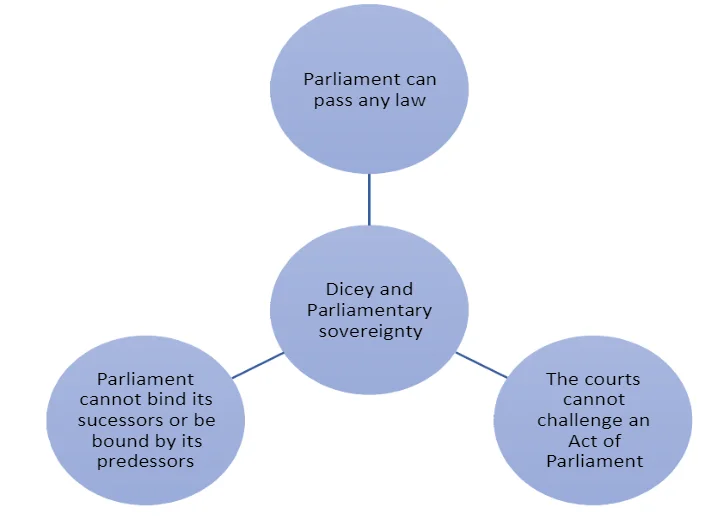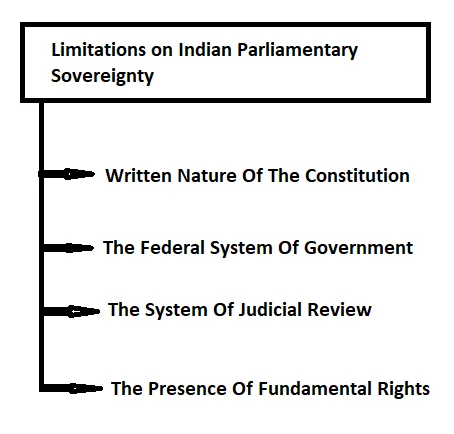The concept of Parliamentary sovereignty signifies supreme power within the state, as exemplified by the British Parliament. Unlike the British Parliament, the Indian Parliament’s sovereignty is limited by legal constraints such as the written Constitution, federal structure, judicial review, and fundamental rights. This distinction underscores the varying degrees of authority and checks on legislative power across different democratic systems.
Parliamentary Sovereignty in India
Parliamentary Sovereignty: Understanding the British and Indian Perspective
- Introduction to Parliamentary Sovereignty: The concept of the ‘sovereignty of Parliament’ is closely associated with the British Parliament, where sovereignty refers to the supreme power within the state.
- Characteristics of British Parliamentary Sovereignty: In Great Britain, the Parliament holds this supreme power, characterized by the absence of ‘legal’ restrictions on its authority and jurisdiction.
- AV Dicey’s Framework of Parliamentary Sovereignty: This Parliamentary supremacy is a fundamental aspect of the British constitutional system, as outlined by AV Dicey, a British jurist. According to Dicey, this principle has three implications.
- Legislative Authority of the British Parliament: The Parliament in Britain has the authority to make, amend, substitute, or repeal any law.
- Equality of Legislative and Constitutional Lawmaking: Constitutional laws can be made by the same procedure as ordinary laws, with no legal distinction between the constituent and legislative authority.
- Judiciary’s Limitations on Parliamentary Laws: The judiciary cannot declare Parliamentary laws invalid as unconstitutional, reflecting the absence of a judicial review system in Britain.

Enroll now for UPSC Online Course
- Limitations on Indian Parliamentary Sovereignty: On the contrary, the Indian Parliament does not enjoy similar sovereignty due to ‘legal’ restrictions on its authority and jurisdiction.
- Key Factors Limiting Sovereignty: Factors limiting the sovereignty of the Indian Parliament include the written nature of the Constitution, the federal system of government, the system of judicial review, and the presence of fundamental rights.
- Structural Similarities and Differences with the British Parliament: While the organizational structure of the Indian Parliament resembles that of the British Parliament, there is a substantial difference.
- The Indian Parliament lacks sovereignty in the sense of unrestricted authority, in contrast to the British Parliament.
- Parliamentary Sovereignty in a Global Context: Similarities in this regard exist with the American Legislature, where Congress’s sovereignty is legally constrained by a written constitution, federalism, judicial review, and a Bill of Rights.

Constitutional Provisions Affecting Parliamentary Sovereignty in India
Various constitutional provisions shape and limit parliamentary sovereignty in India by emphasizing the supremacy of the Constitution, protecting fundamental rights, and providing avenues for judicial review.
- Judicial Review of Laws: Article 13 states that any law that contradicts fundamental rights is considered void. This allows the judiciary to review laws to ensure they comply with fundamental rights.
- Equality Before the Law: Article 14 establishes that everyone is equal before the law and no one is above it. This provision serves as a check on Parliament, preventing discriminatory laws.
- Power to Amend the Constitution: Article 368 gives Parliament the power to amend the Constitution by adding, changing, or removing provisions, following a specific procedure.
- While this provides flexibility, it also requires a careful process for constitutional amendments, limiting parliamentary sovereignty.
- Supremacy of the Constitution: Article 49(1) declares the Constitution as the supreme law of India.
-
- This limits parliamentary sovereignty by ensuring that Parliament cannot make laws that go against the Constitution.
- Establishment of the Supreme Court: Article 124(1) establishes the Supreme Court of India, which is responsible for protecting constitutional principles.
- The Supreme Court tests laws for their constitutionality, adding another check on parliamentary actions.
- Judicial Role in Testing Constitutionality: The judiciary, especially the Supreme Court, is responsible for checking laws against the Constitution.
- Laws must not only be just; they must also comply with the Constitution’s requirements, ensuring that parliamentary actions align with constitutional norms.
- Limits on Delegated Legislative Power: Parliament can delegate some legislative powers, but there are limits to this delegation.
- Beyond these limits, such delegation is invalid, ensuring that key legislative functions remain within the constitutional framework.
Key Judicial Decisions on Parliamentary Sovereignty in India
- Minerva Mills Case (1980): The Supreme Court stated that the executive, judiciary, and legislature must follow the Constitution.
-
-
- Reaffirmed the principle of constitutional supremacy.
- Emphasized that all state actions must adhere to constitutional norms.
-
- Golaknath Case (1967): Examined Parliament’s power to amend fundamental rights.
-
-
- The court ruled that Parliament cannot amend fundamental rights.
- Established the inviolability of core rights against legislative changes.
-
- Keshavananda Bharati Case (1973): Introduced the concept of the “basic structure” of the Constitution.
-
- Laws violating the basic structure are null and void.
- Balanced Parliament’s right to amend laws with the protection of fundamental rights.
- Set a precedent for judicial review of constitutional amendments to preserve the Constitution’s essential character.
Enroll now for UPSC Online Course
| Must Read | |
| Current Affairs | Editorial Analysis |
| Upsc Notes | Upsc Blogs |
| NCERT Notes | Free Main Answer Writing |
Conclusion
In conclusion, the Indian Parliament’s sovereignty is limited by constitutional provisions that prioritize the rule of law and protect citizens’ rights.
- Key judicial decisions have further reinforced this framework, ensuring that parliamentary actions align with constitutional norms.
- This creates a balanced relationship between legislative authority and individual rights, highlighting the importance of checks and balances in governance. Ultimately, these mechanisms promote a healthier democracy in India.
Sign up for the PWOnlyIAS Online Course by Physics Wallah and start your journey to IAS success today!

 GS Foundation
GS Foundation Optional Course
Optional Course Combo Courses
Combo Courses Degree Program
Degree Program









